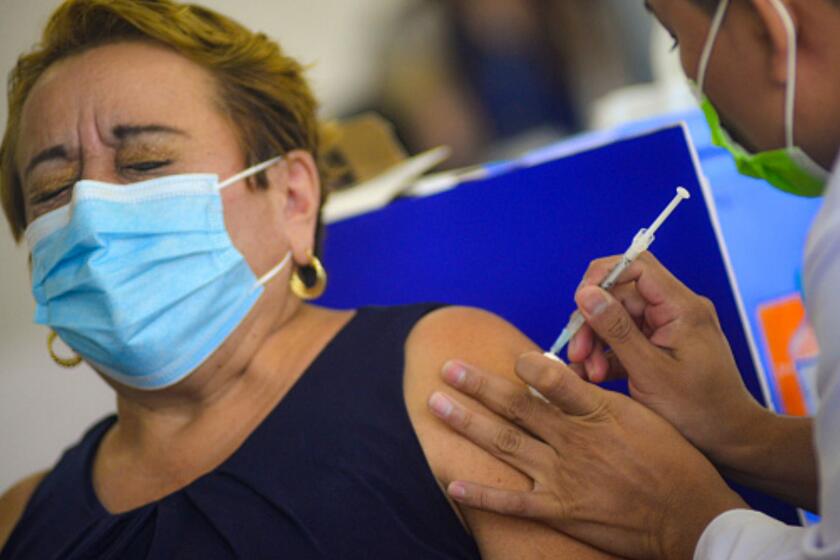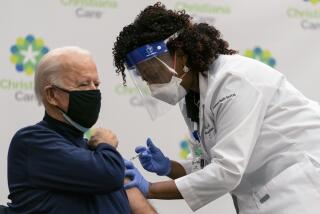Millions of workers now face a vaccination mandate. How to tell if you’re one of them

- Share via
Did you go back to the workplace this year without getting a COVID-19 vaccine, like Green Bay Packers quarterback Aaron Rodgers but without the gargantuan salary? Your date with a needle may be coming soon.
The Biden administration released its long-awaited vaccination mandate for private employers Thursday, adding tens of millions of people to those already required by a patchwork of federal, state and local government rules to be inoculated against COVID-19. Just about anyone who works at a private company with 100 or more employees — and many public-sector workers too — must be fully vaccinated by Jan. 4, 2022, or be tested weekly for the coronavirus.
For the record:
1:55 p.m. Nov. 10, 2021A previous version of this article reported that the OSHA vaccine mandate applies to private companies with more than 100 employees. The mandate applies to companies with 100 or more employees.
What is the requirement?
The federal Occupational Safety and Health Administration laid out three key aspects of the new rule Thursday:
- Vaccination
- Verification
- Testing
Vaccination: Employers covered by the rule must enact a written vaccination requirement for their employees or set a policy that allows unvaccinated workers to be tested once a week. Employers must also provide up to four hours of paid time off for workers to get their shots and paid sick time to deal with any side effects.
Verification: Employers can accept several different forms of official record as proof of vaccination, including an immunization record provided by a doctor, clinic or pharmacy, as long as it includes the person’s name, type of vaccine and where and when it was administered. Employees who have lost their vaccine records or don’t want to provide one can simply attest that they are fully vaccinated. In such cases, OSHA tells employers to remind their workers that there are criminal penalties for lying. Employers are expected to keep records of employees’ vaccination status.
Testing: If employers aren’t going to implement a blanket vaccination policy, they have to create a system for unvaccinated workers to be tested weekly. Employees are expected to report test results to their employer, which will keep them as a medical record while these OSHA rules are in effect. The OSHA policy says that “self-administered and self-read” tests are not allowed — that would rule out workers testing themselves at home with an over-the-counter rapid test. However, such test kits can be used if the testing is observed by the employer or an authorized telehealth provider. The rule does not require employers to pay for the testing, though a union contract or other laws might.
Beyond that, the new rule also requires that employees — vaccinated or not — who test positive for or are diagnosed with COVID-19 be barred from work sites. Companies must also report to OSHA if an employee gets sick, is hospitalized or dies of the disease.
COVID-19 vaccine boosters are now available. But, they’re only recommended for some people. See if you are eligible here.
Who is covered by the mandate?
In short, private employers under OSHA’s jurisdiction (which extends to all 50 states, the District of Columbia, Puerto Rico and several U.S. territories) with at least 100 employees are covered by the new rule. That includes a range of industries; the list, OSHA said, includes “manufacturing, retail, delivery services, warehouses, meatpacking, agriculture, construction, logging, maritime, and healthcare.”
Notably, the rule applies regardless of how many people are together in a physical space. So a company with, for example, five work sites with 20 employees each is treated the same as one with a single work site with 100 employees.
Are there exemptions?
The rule doesn’t cover employers with fewer than 100 employees, OSHA says, because the agency is evaluating whether the requirements are feasible for smaller companies.
People who work outdoors exclusively are not covered. Nor are those who work from home or in a setting where they do not encounter customers or co-workers.
Employers are required to make reasonable accommodations for employees who seek religious or medical exemption from vaccine mandates, but there is no guarantee that people with religious or medical objections can keep their jobs.
Employees of the federal government and federal contractors are covered by an earlier vaccine mandate. About 17 million healthcare workers at hospitals, outpatient clinics, nursing homes and other facilities that serve Medicare or Medicaid patients are also covered under separate regulations that require full vaccination with no testing alternative.
A study of 780,000 veterans shows a dramatic decline in effectiveness for all three COVID-19 vaccines in use in the U.S.
Will this be challenged in court?
Yes. The Associated Press reported that 11 states filed a lawsuit Friday, arguing that the federal government doesn’t have the authority to mandate vaccinations.
Last week, the AP reported, 19 states sued to stop Biden’s narrower mandate that employees of federal contractors be vaccinated. The attorney general of Oklahoma threw his lawsuit into the ring Thursday as well, saying that it is “sinister” for President Biden to use “private employers to do his dirty work.”
What else should I know?
According to OSHA’s more-than-150-page policy, about 62% of people covered by the rules are already fully or partially vaccinated. That means nearly 32 million people would face a requirement to get vaccinated or submit weekly test results.
A summary of the OSHA rules is available online, as are the full policy, resources for employers and more.
L.A. businesses are set to enforce proof of vaccine requirement.
More to Read
Inside the business of entertainment
The Wide Shot brings you news, analysis and insights on everything from streaming wars to production — and what it all means for the future.
You may occasionally receive promotional content from the Los Angeles Times.














